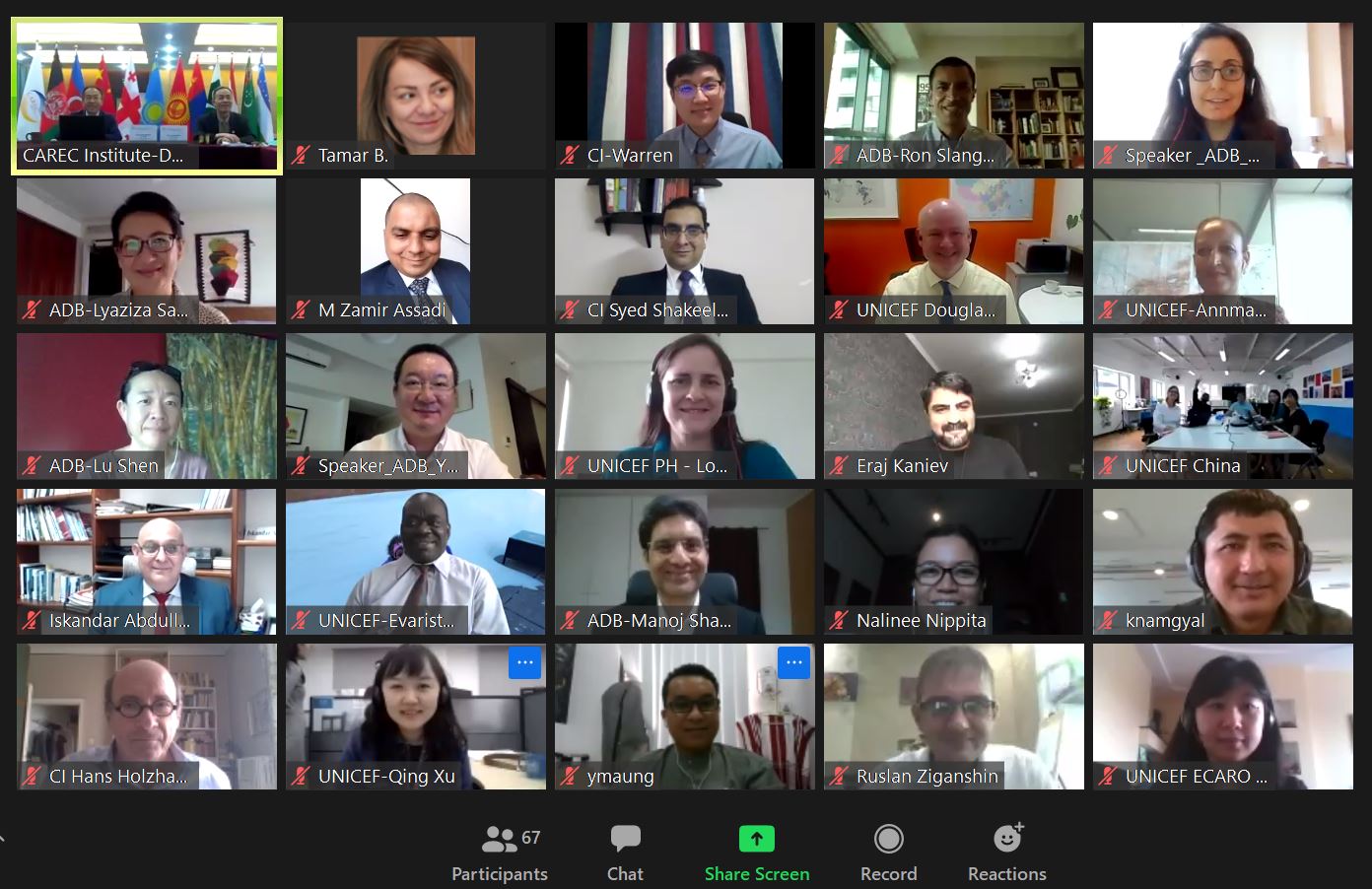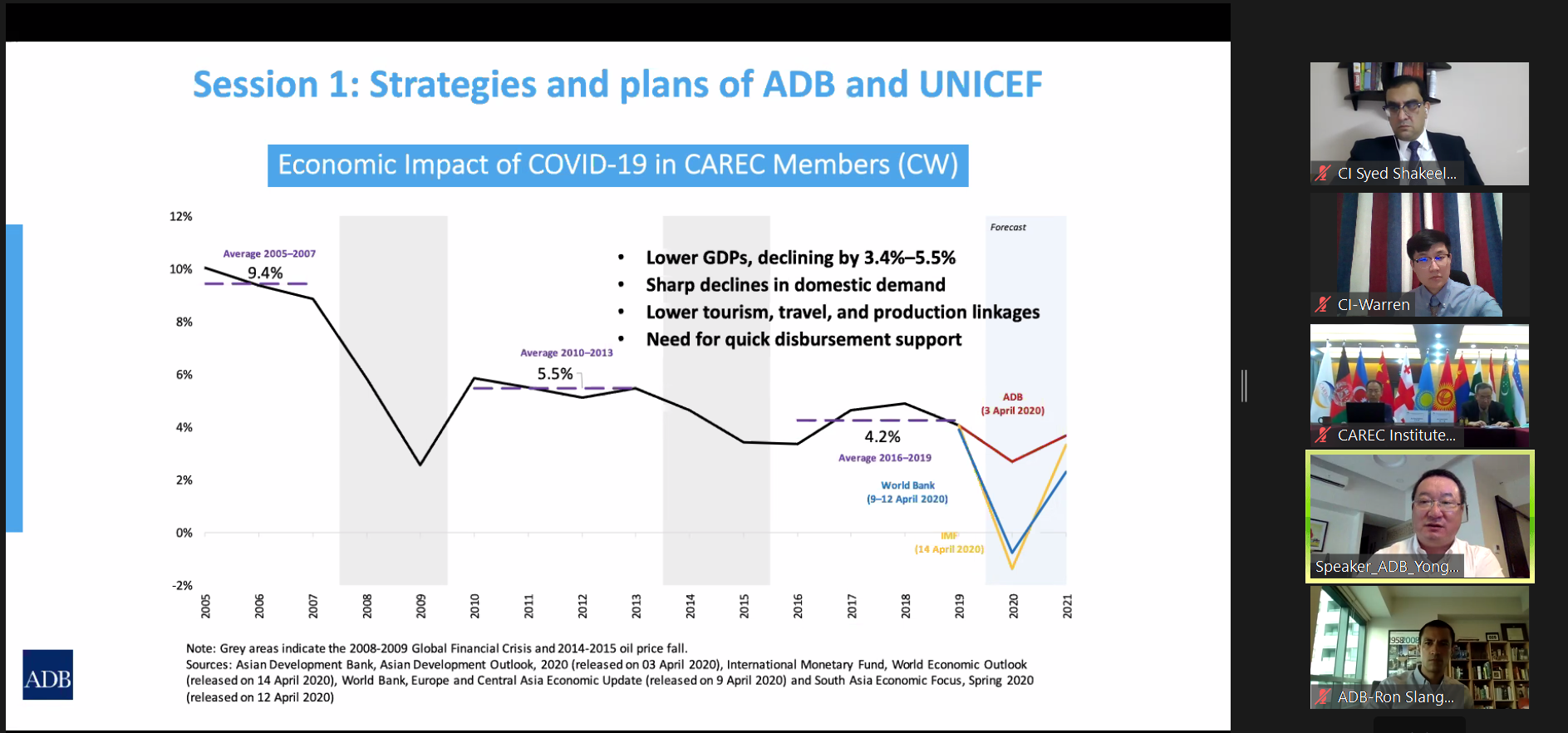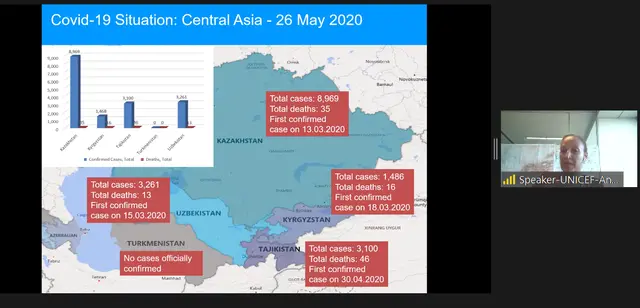On 29 May 2020, the Central Asia Regional Economic Cooperation Institute (CAREC Institute), Asian Development Bank (ADB), and UNICEF co-hosted a webinar on the role of Multilateral Development Partners (MDP) in response to COVID-19 in CAREC region with emphasis on water, sanitation, and hygiene.
The topic emerged from the ongoing CAREC Institute and UNICEF partnership which has ventured to undertake a comparative analysis of water resource management policies and practices in CAREC region. This webinar aimed at enhancing understanding of the role of MDPs in combating COVID-19; how MDP programs help improve resilience to epidemics; and linkages between sanitary services and water accessibility during and after COVID-19 pandemic.

The importance of water and hygiene in these times could not be overestimated. A projected 22 million people in Central Asia alone, or 31 percent of the population, still lack access to safe water. Across CAREC, access for drinking water ranges from 50% to 95%, and access to sanitation is between 40% and 80%.
Meanwhile, the rural versus urban differences remains to be considerable. For rural areas, the highest percentage of access to drinking water is below 70%, and for sanitation the highest figure is between 60-70%.
Recognizing that countries with fragile infrastructure and outdated approaches have less capacity to handle the health crisis, the webinar convened around 70 experts from international development and research institutions and government officials from the region, including the presence of Mr. Syed Shakeel Shah, Director of CAREC Institute, Mr. Douglas James Noble, Deputy Representative of UNICEF China, and Mr. Yong Ye, Director of Urban Development and Water Division of ADB.
Key speakers are senior experts and advisors on water, sanitation, hygiene and emergency from ADB Central and West Asia Department and relevant UNICEF Regional Offices for Central Asia, East Asia and Pacific.

The presentations and discussions covered strategies, plans and response actions with a particular focus on water, sanitation and hygiene, and proposed practical recommendations for resource mobilization and other policy measures to help build up resilience and mitigate the impact of current and future health and economic crisis.
Preliminary findings of the CAREC Institute water infrastructure research indicate that the demand for infrastructure investment in Central Asia is estimated at around 5-7% of the GDP annually.
Although economic growth in the region was attractive for FDI, the current economic downturn, growing public debt and structural problems make infrastructure financing risky. Irregular financing constrains the water sector’s long-term planning, and leads to serious delays in operation and maintenance. Almost 70% of irrigation infrastructure and 50% of water supply systems in Central Asia are outdated, in need of rehabilitation or replacement.
The webinar dialogue highlighted once more that investments in water infrastructure are crucial. Incentives, technology transfer, and water sector reforms are important, and relevant instruments need to be found.
Currently, a large number of MDPs are making financing available to fight the COVID-19 pandemic. To take ADB alone, the organization used the mix of budget support, emergency assistance, and technical assistance instruments to mobilize and deploy USD 20 billion package to address the needs of its developing member countries (DMCs) as they respond to the COVID-19 pandemic.
To meet the growing needs of children impacted by the COVID-19 pandemic, UNICEF has expanded its Humanitarian Action for Children appeal to US$1.6 billion, $300 million of which has been mobilized globally. As of end of April, UNICEF and partners have reached 12 million people with critical water, sanitation and hygiene supplies, in 76 countries.
Extraordinary procurement capacity has been demonstrated given the disrupted supply chains. UNICEF and partners have reached more than 1.67 billion people on COVID-19 through messaging on prevention, including hygiene and handwashing, in 108 countries, and trained more than 300,000 healthcare workers in infection prevention and control.
CAREC countries themselves have announced substantial fiscal packages to deal with adverse impacts of COVID-19. However, despite strong resolve, these responses might significantly reduce fiscal space for implementing other priority areas, like sustainable development goals (SDGs), where MDP support would be needed.
The webinar participants discussed how MDPs have been tested by this pandemic, and the resilience and agility which the institutions demonstrated. The participants explored potential synergies among MDPs to improve response in the sectors of water, sanitation and hygiene, public health, social, and economic aspects; and discussed potential application of different innovative approaches.
The magnitude of the challenge ahead requires, more than ever, strong alliances and partnerships and most importantly, requires all of us to work better together as a sector to translate this into action on the ground for children and their families.
CAREC countries continue facing short- medium- and long-term challenges from the pandemic containment to fiscal policies, most of which require sustainable funding and region-wide approach. For example, there is a need to design a region-wide information exchange and response system; prepare to attract foreign investment when risk-aversion on global markets recedes; strengthen sustainable and green investment; and enhance capacity building, education, and research.
The webinar concluded with a better understanding how to deepen partnerships and enhance synergies with governmental programs to help countries recover and improve resilience to similar future challenges.
About CAREC Institute
The Central Asia Regional Economic Cooperation (CAREC) Institute is an intergovernmental organization dedicated to promoting economic cooperation in the Central Asia and along the ancient Silk Road through knowledge generation and sharing. The Institute is headquartered in Urumqi, Xinjiang Uygur Autonomous Region, the People’s Republic of China (PRC).
The CAREC Institute is jointly shared, owned, and governed by eleven member countries: Afghanistan, Azerbaijan, the PRC, Georgia, Kazakhstan, Kyrgyzstan, Mongolia, Pakistan, Tajikistan, Turkmenistan, and Uzbekistan. It is a knowledge support arm of the CAREC Program which is a proactive facilitator of practical, results-based regional projects, and policy initiatives critical to sustainable economic growth and shared prosperity in the region, guided by the overarching vision of “Good Neighbors, Good Partners, and Good Prospects.”
The Institute acts as a knowledge connector among the five CAREC clusters to ensure coherence in design and implementation of policies, programs, and projects to promote regional economic cooperation and integration.
(ASIA PACIFIC DAILY)
 简体中文
简体中文

